- Home
- Robert J. Harris
Artie Conan Doyle and the Scarlet Phantom Page 3
Artie Conan Doyle and the Scarlet Phantom Read online
Page 3
“I say, that hand is a bit creepy!” Ham mumbled through a mouthful of teacake.
“It’s definitely a clue,” said Artie.
“Extraordinary!” Peril exclaimed. She took the card and examined it through a magnifying glass she whipped out of her skirt pocket.
“It’s not written in blood, is it?” Ham wondered.
Peril sniffed the card then peered at it again through the glass. “No, it’s ordinary red ink, and you can purchase this type of card at any stationer’s.”
“Well, so much for your whirlwind theory,” said Artie. “I don’t think the wind leaves a calling card.”
“Or gives advance warning of its intentions,” Ham added with a hint of smugness.
Peril fumed for a moment before shoving the card back into Artie’s hand. “Then it must be a hoax!”
“But what would be the point?” Artie objected. “Why should anyone make up an absurd story about an invisible man?”
“Because there is something wrong with his brain,” Peril countered stubbornly. “Perhaps in the street he suffered from a seizure that caused him to convulse in such a violent fashion that it appeared as though he were being manhandled by an unseen assailant.”
“But the man himself claimed he was attacked,” Artie insisted.
Peril planted her hands on her hips. “Obviously if his brain had become disordered then his perceptions too would be affected, rendering his testimony quite worthless. This entire business is a fantasy of his unbalanced mind.”
“And the card?”
“He wrote it himself, of course, perhaps while sleepwalking.”
Ham swallowed the last bite of teacake and licked the crumbs from his fingers. “I don’t know. This story of yours sounds even harder to believe than an invisible man.”
“We’ll see about that,” Peril asserted stubbornly. “I’m going to find a text book on disorders of the brain and get to the bottom of this.” She handed Artie a card with her address on it. “Come and see me tomorrow and I’ll prove to you that it can all be explained quite logically.”
With that, she turned and marched away.
Ham shook his head. “Artie, I know you’ve come up with some crazy notions, but that girl really takes the biscuit.”
“At least she’s got some ideas,” said Artie. “I have to confess that I’m stumped. Come on, we’d best take this new evidence to the inspector.”
On the way, Ham recalled gloomily that he had to go home for his piano lessons. “Come and see me in the morning,” he said as the friends parted. “Maybe we can take Berrybus for a walk.” Berrybus, Ham’s enormous black dog, required lots of regular exercise.
***
The Police Office was off the High Street, at the top of Old Fishmarket Close. When Artie arrived, there was a buzz of excitement going on. McCorkle had left word with the desk sergeant that Artie was to be brought straight to his office when he appeared.
In his office, McCorkle was deep in conversation with a broad-shouldered man whose round florid face was topped by a mane of long white hair. When Artie entered, he broke off.
“Ah, Mr Doyle, have you brought me anything of use?”
“I believe so, Inspector. Mr Kincaid has just come into possession of a warning he received yesterday morning but was mislaid until now.”
“A warning?” McCorkle’s eyebrows shot up.
“Yes, sir.” Artie handed over the card with its red lettering and threatening image.
The inspector’s eyes grew wide and he turned to the white-haired man. “Well, this casts a new and troubling light on your business, Mr Seaton.”
Seaton eyed the card and Artie heard him grind his teeth. “So, Inspector, is this directly related to that extraordinary crime I read about in the paper this morning?”
“It would appear so,” McCorkle affirmed. “Mr Doyle, this is Mr Reginald Seaton, the prominent textile importer. Mr Seaton, this young fellow has been running some errands for me, and I have learned by experience that he has an occasional insight into the ways of crime. Might you show him the item you have brought in?”
Seaton treated Artie to a dubious glare, then opened his hand to display a card. It was identical in size to the one Artie had just handed the inspector and also contained a message in red ink.
The handwriting and the sign of the clutching hand were identical to those on the card Kincaid the jeweller had received.
Artie gasped as a surge of excitement filled his chest. This second card meant Peril’s theories were wrong. There really must be some fiend at work.
“How was this delivered to you, if you don’t mind my asking?” Artie inquired.
Seaton pursed his lips. “It was the strangest thing. After breakfast, I entered my study as usual and found this lying on my desk on top of my papers. I questioned my secretary Hubert Simpkin, who swore he had not placed it there and that no one else had entered or left the house all morning.”
“Unless they entered and left unseen.” Artie’s voice was hushed.
McCorkle cleared his throat uneasily. “Tell me, Mr Seaton, are you acquainted with Mr Kincaid the jeweller?”
“I’d never even heard of the chap until I saw his name in this morning’s paper,” said Seaton. “I had not connected that robbery with the prank someone is playing on me – not until now.”
“I suspect it is more than a prank, Mr Seaton,” McCorkle stated gravely. “One robbery has already been committed and it appears you are to be the target of a similar crime.”
“Bosh!” Seaton scoffed. “It is clearly a piece of nonsense, a jape of some sort. I was half-minded not to report it, but Simpkin insisted. He’s a nervy chap and easily frightened by such things.”
“But you do have items of value that would be of interest to the thief?” the inspector inquired.
“I keep my cash in the bank,” Seaton replied. “My house contains a few antiques, the silverware and my business papers.”
A sudden thought struck Artie. “Do you keep any jewels in your home?”
“Why, yes,” the businessman replied. “I recently purchased some rubies from a contact in India, as an investment, you know.”
“I take it they are secured,” said the inspector.
“They are locked away in a safe in my study,” Seaton responded stiffly, “a safe to which only I have the combination. No thief, invisible or otherwise, is going to get at them.”
“Nevertheless,” said the inspector, “I believe it would be prudent for you to have a police guard, just for tonight.”
“I do not care to have a crowd of bobbies tramping all over my new carpets,” growled the merchant.
“It will just be myself and a constable,” McCorkle assured him, “and young Mr Doyle here.”
“Very well then.” Seaton was grudging. He snatched up his hat and headed out the door. “I shall expect you at seven. And please be discreet.”
Once the merchant was gone, McCorkle approached Artie in a conspiratorial manner.
“I would be grateful if you could make yourself available this evening, Mr Doyle. This is a rum business, and the more eyes we have about the place the better.”
“Why, yes, of course,” said Artie. But, in fact, he was rather worried what his parents would say when he told them he was on the trail of an invisible robber.
5.
The Locked Room
Back home at Sciennes Hill Place, Artie picked his way through his supper, trying to work up the nerve to tell his parents about his new investigation. They knew he had been involved in two mysteries before and were happy that the police had kept this a secret from the public. His mother in particular was concerned that no scandal should arise from a member of the family being involved with graveyards and mysterious events.
Once his two sisters had been tucked into bed, he finally broke the news.
“An invisible robber?” said his father. “Yes, I read about it in the paper. But what has that to do with you?”
“Inspe
ctor McCorkle thinks I might have some ideas, spot a few clues, that sort of thing.”
“It sounds to me like the work of an unclean spirit,” said his mother, crossing herself for protection against evil. “The thing to do is bring Father Mulholland in to exorcise it.”
“I think it’s a bit early to be calling in the Church, Mary,” Mr Doyle objected.
“Yes, we don’t really know what we’re dealing with yet.” Artie was horrified at the thought of bringing their local priest in to splash holy water around.
His mother wagged a warning finger. “Well, whether it’s a spiritual force or just some trickery, it sounds far too dangerous for you to be poking your nose in.”
“The inspector will be there with one of his constables,” said Artie. “Besides, the only one being threatened is this Mr Seaton, and with us there to scare the bandit off, nothing might happen.”
“I suppose if the police are on the scene and they really want your help,” said Mr Doyle, “then we shouldn’t stand in the way of the law.” There was just a hint of pride in his voice that the Edinburgh Constabulary placed such confidence in his son.
There was a knock at the front door, and when they opened it they saw a constable standing stiffly to attention. He was a fair-haired young man whose large ears stuck out below a sturdy policeman’s helmet of the type that had recently replaced the old-fashioned top hat. He wore a long, dark blue coat and a leather belt from which hung a truncheon and a lantern.
“I’m Constable Peter Pennycook,” he explained. “Inspector McCorkle sent me to fetch young Master Doyle.”
While Artie donned his coat and cap, his mother told the constable to keep a close eye on her son and see that no harm befell him.
“It’s not too late to arrange for a priest to be on hand,” she advised him.
“I don’t think there’s any call for that, ma’m,” Pennycook answered politely, “but I will pass on your advice to the inspector.”
As they headed down the tenement stairs, Artie wished that Ham could be here with him, and even that rather trying girl, but Inspector McCorkle insisted that it would only provoke the already ill-tempered Mr Seaton to have a trio of youngsters invading his house.
A horse-drawn cab was waiting. Once they were both inside and on their way, the young constable removed his helmet and scratched his head.
“The inspector seems to lay great store by your abilities, Mr Doyle.”
Artie shrugged. “I think I just get lucky sometimes.”
“In my opinion, doggedness is the most important quality in a policeman,” said Constable Pennycook. “The ability to stick with an investigation and see it through to the end.”
“You could well be right,” said Artie with more conviction than he felt.
Pennycook replaced his helmet and sighed. “Still, I don’t expect anything will happen tonight. This invisible man business must be some sort of practical joke.”
“Do you really think so?”
“You’d be surprised how often people waste police time with shenanigans.” The constable allowed himself a small chuckle. “Why, one time I had to stand guard over a woman who claimed there were Cossacks in fur hats climbing around in the trees at the back of her house. Turns out they were just squirrels and she’d been drinking too much gin.”
Shortly thereafter they arrived at a handsome two-storey house in Regent Terrace. It was surrounded by a large garden and several beech trees. Once they had climbed out of the cab, the constable led the way up the front path. When they knocked on the door, they were admitted by a pale little man who twitched nervously as he showed them into the parlour. Artie assumed he was Hubert Simpkin, the secretary whom Seaton had spoken of earlier.
Some new development appeared to have upset the merchant and the inspector was trying unsuccessfully to calm him.
“Are you trying to make a comedy of this?” Seaton waved his evening paper under McCorkle’s nose.
When the inspector made no reply, Constable Pennycook intervened in support of his chief.
“I think comedy is putting it rather strongly, sir,” he protested mildly.
“You think so?” Seaton rounded on him and thrust the newspaper at the young policeman. “Just have a look at this!”
The constable took the paper and he and Artie peered at it. It was a copy of the Edinburgh Evening News, a new title which the publishers of the Scotsman had launched only a few weeks ago. It was folded open at the main story of the day and the headline read:
WHO IS THE SCARLET PHANTOM?
The article repeated that morning’s Scotsman account of the attack on Kincaid, adding the new information about the red-ink warning with an accompanying sketch of the card and its clutching hand. The article ended with the words ‘When will the fiend strike again?’
“Scarlet Phantom indeed!” Seaton snorted. “What utter poppycock! I suppose you have also leaked to the press that you expect another visitation from this unseen villain tonight.”
“Not at all, sir,” McCorkle said patiently. “In fact, if I had been aware in advance of the threat delivered to Mr Kincaid, I would have advised him not to share it with the press.”
“I have made it clear that I require the utmost discretion.” Seaton wagged a scolding finger. “I cannot allow myself or my business to become the object of such lurid sensationalism.”
“I’m sure no one wants that, sir,” McCorkle assured him.
Seaton snatched the newspaper back from the constable and scowled at the headline before tossing it aside. “All this fuss over a bandit whose existence is quite impossible. Your being here at all is an utter waste of time.”
“Now, now, sir,” said the inspector, “if the evening passes without incident, all well and good. But if the criminal should strike, I believe you will be very grateful to have the police on hand.”
“I intend to work alone in my study.” Seaton pointed to a door at the far end of the parlour. “I shall be dealing with a number of confidential documents and I can’t have strangers looking over my shoulder while I conduct my business.”
“I assure you, sir, that we would do no such thing,” said McCorkle.
“Why should I trust you?” Seaton demanded. He swept a hostile gaze over all of them. “Any of you? In fact, any one of you might be this fiend. The whole thing might be a hocus cooked up by the police to glorify themselves.”
Artie found it curious that the man kept changing his mind. One moment the Phantom couldn’t possibly exist, the next moment it might be any one of them who was bent on robbing him. He thought it best to say nothing.
“Surely you cannot suppose—” McCorkle began.
“You and your associates may post yourselves out here,” the merchant snapped. “I shall lock myself in the study and work on my private papers – alone. Simpkin!” He caught the eye of his pale secretary. “Bring me a decanter of brandy.”
“Immediately, sir.” Simpkin bobbed his head and scurried off.
Seaton disappeared into the study, banging the door shut after him.
“Well, he isn’t exactly grateful for our help, is he?” Pennycook noted wryly.
McCorkle scowled at the study door. “You will find, Constable, as you advance through the ranks, that a policeman is rarely welcomed warmly, even by those he seeks to protect.”
“What do you expect to happen tonight, Inspector?” Artie asked.
“I have no idea,” McCorkle replied, rubbing his moustache. “I intend to place myself by the door so that no robber, invisible or otherwise, can possibly get by me.”
“Is there any other way into the study?” Pennycook inquired.
McCorkle shook his head. “I inspected the room thoroughly. There is only this door, and the window is securely fastened from the inside. There is a fireplace, but the chimney is too narrow to admit even a small child.”
“I expect we’re in for a dull night of it then,” the constable concluded.
He could not have been more wrong.
6.
The Phantom Strikes
Artie, McCorkle and Pennycook settled themselves onto three hard, straight-backed chairs and began their vigil in the parlour of the merchant’s grand town house. When Simpkin appeared with his master’s brandy, he was so hunched over and silent, Artie barely noticed him until he was at the study door. He tapped lightly and was summoned into the room by a barked command. When he reappeared, he made a final grovelling bow before closing the door.
Turning to the three visitors, he said, “Might I offer you gentlemen some coffee?”
“Good idea,” said the inspector. “It will help us to stay alert.”
“If there’s anything to stay alert for,” Constable Pennycook murmured.
A few minutes later the secretary arrived with a pot of coffee. He poured three cups and left, saying he would be in his upstairs bedroom if anything else was required.
“What a strange little fellow he is,” commented McCorkle, picking up his cup.
The next two hours passed uneventfully. Artie was glad he had brought a book to read – Rob Roy by Sir Walter Scott, which told of the adventures of a bold Scottish outlaw. The exciting tale helped him ignore how uncomfortable his chair was.
Inspector McCorkle occupied himself with reading every word in the newspaper and occasionally closing his eyes for a brief nap. Constable Pennycook periodically got up to pace the floor then sat down again with his gaze moving back and forth between the study door and the door that led out into the hallway.
When the grandfather clock in the corner struck half past nine, it roused McCorkle from a light slumber. His eye roved around the room, then briefly back to the paper before alighting upon Pennycook, who was alternately chewing the end of a pencil and scribbling in a notepad. “What are you scrawling there, Constable?”
Pennycook completed a sentence before looking up. “Making a few notes, sir, you know, to sharpen my detective skills.”

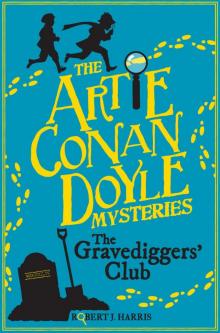 Artie Conan Doyle and the Gravediggers' Club
Artie Conan Doyle and the Gravediggers' Club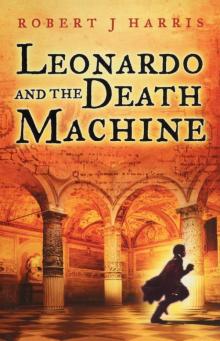 Leonardo and the Death Machine
Leonardo and the Death Machine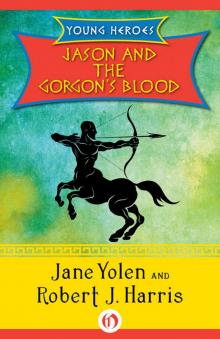 Jason and the Gorgon's Blood
Jason and the Gorgon's Blood Will Shakespeare and the Pirate's Fire
Will Shakespeare and the Pirate's Fire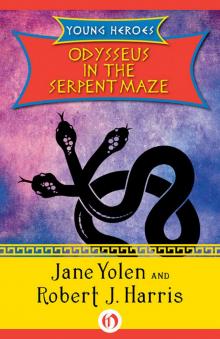 Odysseus in the Serpent Maze
Odysseus in the Serpent Maze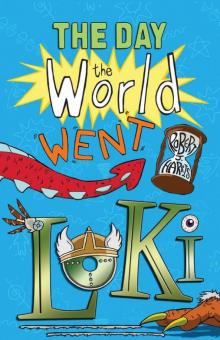 The Day the World Went Loki
The Day the World Went Loki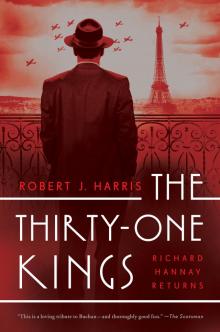 The Thirty-One Kings
The Thirty-One Kings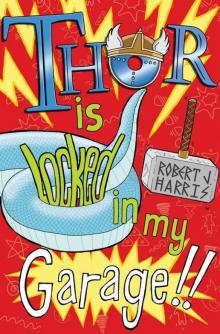 Thor Is Locked in My Garage!
Thor Is Locked in My Garage!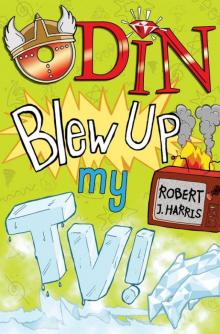 Odin Blew Up My TV!
Odin Blew Up My TV!